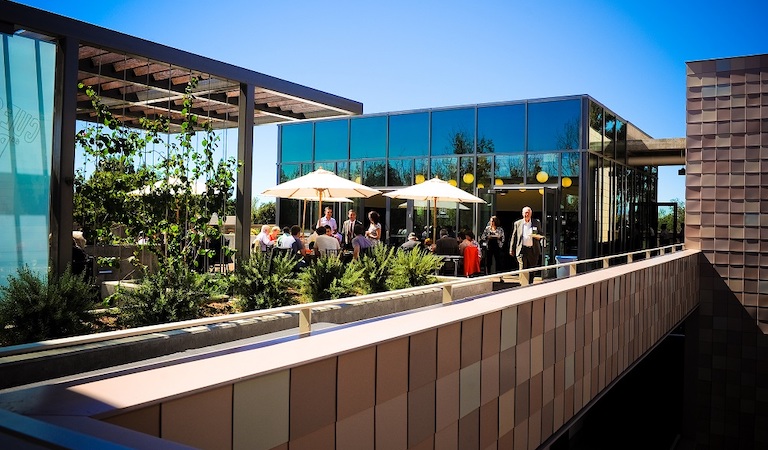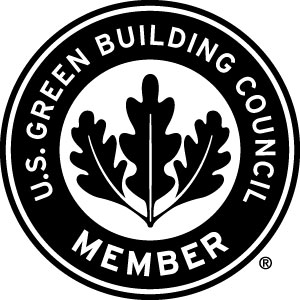Sustainability on Campus

Harvey Mudd College recognizes sustainability as one of this century’s biggest challenges and is committed to reducing its impact on the environment. The College is a member of the U.S. Green Building Council (USGBC), a signatory to the Second Nature Climate Leadership Carbon Commitment, and a member of the Association for the Advancement of Sustainability in Higher Education (AASHE). In 2015, The Hixon Center for Climate and the Environment at Harvey Mudd College was created to initiate, support and coordinate College-wide programs and activities related to sustainability research, teaching and practice.
Beyond our academic programs, the College has a Sustainability Committee appointed by the Board of Trustees composed of representatives of all stakeholder groups in the College to develop priorities and implement decisions regarding the College’s sustainability program. A sampling of the program’s practices include:
Sustainable Buildings
For over twenty years, Harvey Mudd has committed to designing and constructing new buildings to a minimum standard of LEED Silver (or equivalent). As we continue to develop a sustainable campus, future buildings will be delivered with environmental stewardship and occupant wellness in mind.
Utility Consumption Reduction
Campus water consumption and reliance on utility-provided electricity has been in a steady decline since 2007, all while the College has added significant new academic, residence halls and support facilities. Meanwhile, major equipment and fixtures in older buildings are replaced with more efficient options during renovations.
ENERGY STAR-certified or premium-rated products are purchased for use on campus wherever possible.
Solar Power
The College is nearing completion of a second photovoltaic (PV) system that will generate approximately 425 kW of clean energy. Combined with our existing solar infrastructure, this will bring our total renewable energy generation capacity to approximately 1.125 MW.
We remain committed to sustainability and will continue evaluating the integration of PV systems into future campus developments.
The project is scheduled for completion by the end of 2025.


Landscaping and Irrigation
The College recently upgraded our master irrigation controller to a more precise system that optimizes water usage based on detailed landscape data. The system incorporates information about sprinkler types, layout, slopes, and plant species to determine ideal runtimes and water application levels. It monitors flow rates and automatically shuts off when leaks are suspected, helping prevent water waste. Watering schedules are tailored to plant needs, soil types, and zoned weather conditions, ensuring efficient and sustainable irrigation. Additionally, the system provides alerts for low watering levels to support proactive maintenance.
Dining Services
The College’s to-go boxes, dessert plates, eating utensils, cups and lids are all made of biodegradable materials. Produce offered by Dining Services is grown in a system that emphasizes protecting and enhancing natural resources, using alternatives to pesticides, and caring for the health and well-being of farm workers and rural communities.
Transportation and Charging Stations
The College’s rideshare program offers incentives to encourage faculty, staff and students to carpool and use public and alternative forms of transportation whenever possible. To learn more about the rideshare program, visit the Rideshare Program Incentive Page.
Electric vehicle charging stations are located in the northwest parking lot (north of Parsons, west of the Shanahan Center) and at the solar carport on the east side of campus. To learn more about the electric vehicle charging stations and to sign up for their use, please visit the Parking Page.
Recycling, Reuse and Composting
In addition to trash receptacles, recyclable waste receptacles are offered throughout campus. Trash and recyclables from around campus are efficiently compacted and bundled, and food waste from Dining Services is composted.
College restrooms, labs and kitchen are stocked with recycled paper products.
Facilities and Maintenance offers an e-waste recycling pick-up program on campus at least two times each year.
The College mail room provides bins for students to store reusable packing and shipping materials such as cardboard boxes, packing peanuts and bubble wrap.
Past Building Retrofit Projects
- Ceramic film on older window systems
- Smart Labs upgraded airflow control system to reduce the overall number of air changes per hour in chemistry teaching labs
- LED lighting throughout campus
- Solar-reflective/cool roofing
- Native landscaping and water-management irrigation systems where appropriate
